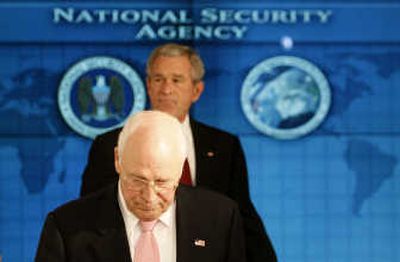Bush makes wiretapping case

WASHINGTON – President Bush plunged directly into the campaign to save his warrantless wiretapping program, arguing Wednesday that telecommunications companies that cooperated with spy agencies should be granted retroactive immunity from possible prosecution.
Bush also urged Congress to pass a permanent revision of legislation that gave the program a six-month life span. His comments came as he toured the National Threat Operations Center, located at the ultra-secret National Security Agency at Fort Meade, Md.
“The need for action is clear,” Bush said. “Unless the reforms in the act are made permanent, our national security professionals will lose critical tools they need to protect our country.”
Bush argued that telecommunications companies who provided data to the government under the program should be granted immunity from prosecution in the event their actions are determined to have been illegal. Rights advocates have filed dozens of lawsuits against telecommunications companies for assisting the government.
“It’s particularly important for Congress to provide meaningful liability protection to those companies now facing multibillion-dollar lawsuits only because they are believed to have assisted in efforts to defend our nation following the 9/11 attacks,” Bush said.
It is not clear how much personal data the companies may have provided the government under the warrantless surveillance program, or how many Americans may have been affected.
Under pressure from the administration, Congress hastily passed a bill in August that revised the 1973 Foreign Intelligence Surveillance Act to authorize the wiretapping program for a six-month period. Democrats are in the process of rewriting that legislation, which many in the party say gave the administration too much leeway to spy on Americans.
But Democrats indicated they intend to tighten the reins as soon as they can.
“We strongly agree that intelligence tools should be modern,” said Rep. Silvestre Reyes, D- Texas, House intelligence committee chairman. “However, the president’s bill could allow for broad surveillance on Americans without a warrant – and the Constitution does not allow for that.”
The administration pressed Congress to pass the legislation last summer because of a ruling by a secret national security court that the administration program, which White House officials insist does not target Americans, did not comply with the foreign intelligence surveillance law. The law requires the government to obtain a warrant before conducting national security surveillance on any American.
Administration officials claim the court ruling shut down a crucial flow of intelligence and urged Congress to pass the law in the final days before a summer recess. Democrats, worried that voters feel they are not tough enough on terrorists, complied.